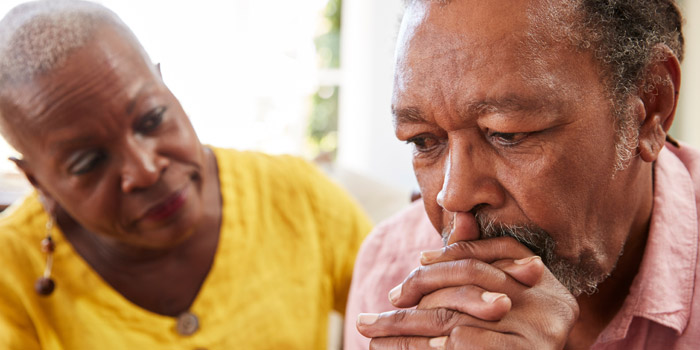Depression occurs in about one out of five seniors and, among the homebound, that figure may be as high as 46 percent according to The National Alliance on Mental Illness (NAMI). But, despite its frequency, depression is not a normal part of aging.
Depression can lead to any number of health issues, but more generally, interferes with one’s daily life. Many people suffering from depression do not seek help. The good news is that, even those with the most severe depression can get better with treatment. Psychotherapies as well as medications can effectively treat depression – if depression is identified and help is sought.
Seniors and their caretakers should be mindful of a few common indicators that might be a sign of more serious depression that can lead to bigger issues. Some symptoms may be easy to overlook.
Is Depression Among Seniors Ignored?
Depression can sometimes be ignored because it is mistaken for other age-related illnesses or personal loss. Seniors, themselves, often ignore symptoms believing they are “normal” feelings related to getting older. This may be compounded by the death of a spouse or family members, relocation or retirement. Often these events trigger depression that may not be immediately recognized as such.
Typical senior maladies like diabetes, cancer, hypertension, heart disease, strokes or chronic pain may trigger depression, too. Another contributor to senior depression may be a combination of medicines that create side effects.
Sometimes living alone creates a feeling of social isolation. As a consequence, many elderly people suffer from depression because signals are not recognized and effective treatment is delayed.
What Are the Signals?
What can families do to recognize depression among their older loved ones? The list below represents some of the signs you can look for:
- Do you observe your senior sleeping too much or too little or awakening frequently?
- Do you see signs of fatigue and/or decreased energy?
- Does your senior have difficulty concentrating, remembering details, or making decisions?
- Are persistent sad, anxious, or “empty” feelings being conveyed in actions or words?
- Do you perceive feelings of hopelessness or pessimism in your senior?
- Do you observe irritability, agitation or restlessness?
- Does your senior express feelings of guilt, worthlessness or helplessness?
- Is your senior overeating or, perhaps, not eating enough?
- Has your senior lost interest or pleasure in activities he or she previously enjoyed?
- Perhaps most obvious, has your senior ever expressed any thoughts about suicide?
Then What Do You Do?
First, be observant. Take an inventory of the behaviors using the list above. Next, have a conversation with your loved one to further explore how he or she is feeling and delve into what may be the source of concern. Listen carefully. Let your loved one speak without interruption or debate.
Depressed older adults often talk about the physical symptoms of depression. Phrases like “I’m not sleeping well,” or “I’m just not hungry” may be clues for further exploration. If there are others actively involved in his or her care, speak with them about their observations. For example, if there is a home care aide who may be in the home on a daily or weekly basis, ask about any observed changes in behavior, eating or sleeping patterns.
Importantly, reassure your loved one that with a little help, he or she can enjoy life more fully. Talking about it is an important first step. It is always possible that your senior may be holding back because he or she doesn’t want to create an additional burden for you or any other person who is part of the care team.
Finally, tap into home and community resources and support systems to help identify depression and guide you to appropriate remedial care. Psychotherapy, counseling, or “talk therapy” that can help a person identify and change troubling emotions, thoughts, and behavior. It may be done with a psychologist, licensed clinical social worker, psychiatrist, or other licensed mental health care professional.

